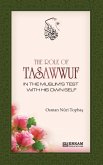The author of the Epistle on Sufism, Abu 'l-Qasim al-Qushayri (376/986-465/1074), was a famous Sunni scholar and mystic (Sufi) from Khurasan in Iran. His Epistle is probably the most popular Sufi manual ever . Written in 437/1045, it has served as a primary textbook for many generations of Sufi novices down to the present. In it, Al-Qushayri gives us an illuminating insight into the everyday lives of Sufi devotees of the eighth to eleventh centuries C.E. and the moral and ethical dilemmas they were facing in trying to strike a delicate balance between their ascetic and mystical convictions and the exigencies of life in a society governed by rank, wealth, and military power. In al-Qushayri's narrative, the Sufi 'friends of God' (awaliya') are depicted as the true, if uncrowned, 'kings' of this world, not those worldly rulers who appear to be lording it over the common herd of believers. Yet, even the most advanced Sufi masters should not take salvation for granted. Miracle-working, no matter how spectacular, cannot guarantee the Sufi a 'favourite outcome' in the afterlife, for it may be but a ruse on the part of God who wants to test the moral integrity of his servant. In the Epistle these and many other Sufi motifs are illustrated by the anecdotes and parables that show al-Qushayri's fellow Sufis in a wide variety of contexts: suffering from hunger and thirst in the desert, while performing pilgrimage to Mecca, participating in 'spiritual concerts', reciting the Qur'an, waging war against the 'infidel' enemy and their own desires, earning their livelihood, meditating in a retreat, praying, working miracles, interacting with the 'people of the market-place', their family members and peers, dreaming, and dying. About The Author Abul Qasim Al-Qushayri was a student of the Shaykh Abu `Ali al-Daqqaq, He was a muhaddith who transmitted hadith to pupils by the thousands in Naysabur, in which he fought the Mu`tazila until he fled to Makkah to protect his life, He was also a mufassir who wrote a complete commentary of the Qur'an entitled Lata'if al-isharat bi tafsir al-Qur'an (The subtleties and allusions in the commentary of the Qur'an).
Hinweis: Dieser Artikel kann nur an eine deutsche Lieferadresse ausgeliefert werden.
Hinweis: Dieser Artikel kann nur an eine deutsche Lieferadresse ausgeliefert werden.








